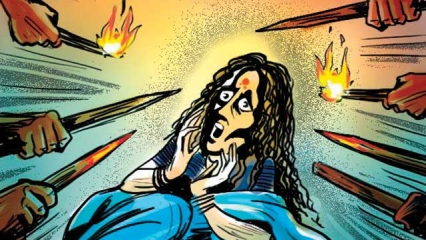How Practice Of Social Boycott, Ostracisation, Kangaroo Court & Witch-Hunting Is Eroding Odia Society; What Govt Must Do

Despite a modern mindset and acceptance of changing social norms, age-old practices like ostracism, social boycott, Kangaroo Court, and witch hunting continue to exist in Odisha and unfortunately, the state’s oversight in these matters is also giving fillip to naxalism, communalism, and casteism. The government’s dream of a Vibrant New Odisha by 2036, will fall short if we fail to eradicate these inhuman social evils from our society.
Social boycott is a collective act of refusal by society with the objective to force the individual to voluntarily leave society.
Ostracism is similar, but it is more evil. It refers to the forcible expulsion of a person from society for any reason, accompanied by the confiscation of his/her property. Both, social boycott and ostracism are the most formidable weapons in the hands of caste-based corrupt mindsets.
Kangaroo Court is used in a judicial system where the judgement against the accused is usually predetermined.
Witch-hunting is a clear infringement of the fundamental rights, including the Protection of Human Rights Act, 1993.
Dr. B.R Ambedkar drafted an article titled ‘Protection against Social Boycott’ and advocated ‘State Socialism’ and ‘Economic Democracy’. Articles 15, 17, and 25 of the Constitution, together constitute a code that is a somewhat attenuated and diluted version of Ambedkar’s original and radical proposals – to have a Constitution that provided not only individual freedom and freedom of community but also freedom from the community. In Sardar Syedna Saifuddin vs. State of Bombay Case, 1962, a five-judge bench of the Supreme Court struck down the Bombay Prevention of Excommunication Act, 1949 as unconstitutional. The majority held that the Act violated Articles 25 and 26 of the Constitution of India.
Reported incidents of social evils in Odisha
- The ostracisation of 200 Dalit families of the Bauri community of Haridapadar under Aska block in Ganjam, the Chief Minister’s home district.
- The families of Bulu Nahak and his brother-in-law, Uma Das from Purushottampur, Ganjam were left to the mercy of God due to the ostracisation. Prabhanjan Pradhan, a professor in a Mumbai college, had returned to his home in Purusottampur as his family was ostracised by the All Odisha Banayat Odia Samaj (AOBOS), a Ganjam-based caste group, or ‘Kula Samaj’, as it is called locally. Hailing from Kalamba village, Ganjam, the cousin brothers are, incidentally, Indian Air Force and Indian Navy officers. They got caught in a cast-bound social boycott and ostracisation, because of inter-caste marriage.
- 40 Dalit families are facing a social boycott from upper caste villagers in Kantio Kateni village of Dhenkanal district. OHRC has taken suo motu cognizance of this issue.
- In Kendrapara district, at least 60 families in a village were socially boycotted by other villagers due to the fear of spreading of an unidentified skin infection.
- Around 400 people residing at Munda Sahi of Magurganda Patna were barred from moving out. S
- A 14-year-old boy tried to die by suicide and is fighting for his life after a Kangaroo Court ruling in Bhubaneswar.
- In Mancheswar Leprosy Colony, a Kangaroo Court tied a young woman with a pole for the entire night and tortured her brutally for meeting her boyfriend.
- In another case, a woman was tied to a tree and thrashed mercilessly by a Kangaroo Court in the Baliapal area in Balasore district for allegedly selling liquor.
As per the NCRB data, Odisha witnessed 19 witchcraft-related murders in 2019, 18 murders each in 2018 and 2017, and 25 in 2016. The cruel practices were common in communities with unequal socio-economic systems and gender inequality, inadequate healthcare, and widespread illiteracy. 83% of the total witch-hunting and witch-branding cases in Odisha are concentrated in Mayurbhanj, Sundargarh, Rayagada, Malkangiri, Keonjhar, Gajapati, and Ganjam districts. Villagers beat a person to death in witchcraft-related attacks in Madhurjhol village under Kabirsuryanagar police station, Ganjam district.
The practice of social boycotts and ostracisation leads to inequality and also violates Articles 14, 15, 17, 19, 21, 25, & 26 of the Constitution of India. The Maharashtra Prohibition of People from Social Boycott (Prevention, Prohibition, and Redressal) Act, 2017, Maharashtra is the only state in India to have enacted such a law. In 2019, the Odisha High Court took serious note of the growing corrupt and evil practices of “social boycott/ostracism” in the state. The Government of Odisha notified “The Odisha Prevention of Witch-Hunting Act, 2013” with effect from February 2014 and has undertaken IEC activities for creating social and legal awareness against witch-hunting with the help of Anganwadi workers, self-help groups, Panchayati Raj institutions, etc.
There is no doubt, the State Government has attempted to eradicate such practices but a more serious endeavour is required to combat them to protect the citizens from the menace.

Comments are closed.